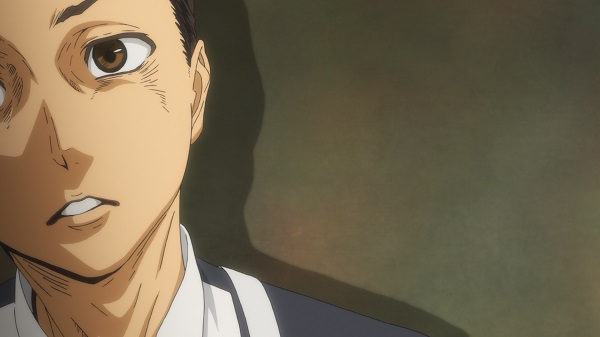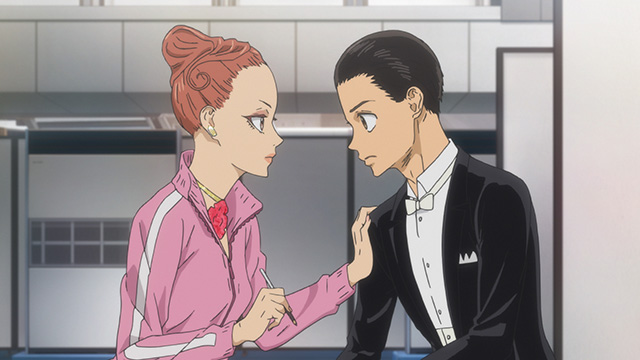We’re not having much fun watching

Tatara and Chinatsu enter their second A class competition despite having only a few months of preparation and no indication that they’ve jelled as a pair. Unsurprisingly, they get off to a bumpy start.
Tatara keeps messing up, and because Chinatsu has little patience for losing, especially against her former partner Akira, they bicker. A lot. Whether it involves Chinatsu’s overwhelming strength or Tatara’s meek personality, each finds a fault in the other and picks at it like a week-old scab. In the middle of the first heat, Tatara remarks that he isn’t having much fun dancing with Chinatsu. We’re not having much fun watching it, either.
In the stands, Hyodo, Gaju, Shizuku, and Mako provide commentary on Tatara/Chinatsu’s performance, as well as insight on the fashion, intensity, and required stamina for competitive dance. Though the information frames the competition well, it would have informed the audience much better at the beginning of the series than now, especially with only five episodes remaining. Because the secondary characters have done nothing the past few episodes but remark on Chinatsu/Tatara, they’ve devolved into vessels for analysis on the main characters instead of their original intriguing personalities.
Gaju, Shizuku, and Mako all worry about Tatara/Chinatsu, but Hyodo somehow sees the brilliance behind their incompatibility. The judges agree: they give Tatara/Chinatsu full scores in both the first and second rounds despite neither Tatara nor Chinatsu feeling confident about their performance. And just when the plot advancement couldn’t get any more forced, we get a backstory that I can’t imagine many people asked for.
But credit where credit’s due: Akira’s backstory unexpectedly shines as the series’s most outstanding moment. We can now confirm that she most certainly wants to be sitting in a tree k-i-s-s-i-n-g Chinatsu, but their relationship goes far beyond unrequited feelings. They bonded after pairing up against schoolyard bullies, and by dancing together, Chinatsu found her power while Akira found a partner. Like with every other tragic gay backstory, however, there’s a second perspective that needs addressing. If the show can recreate the pathos for Chinatsu’s backstory that it generates for Akira’s, we might be in for a few Kleenex moments.
Ballroom still has incredible potential
Maybe most tragic about Akira’s backstory is that it highlights a far more interesting story than the one we get from Tatara. That Ballroom has leaned so heavily on its bland MC with far more colorful secondary characters in the wings should frustrate the audience. With its chosen topic, gender politics, and slack-jawed animation, Ballroom still has incredible potential, the most recent episode its best example. But with just over a month of episodes left, no one should expect a miraculous transformation into what it could’ve been.







